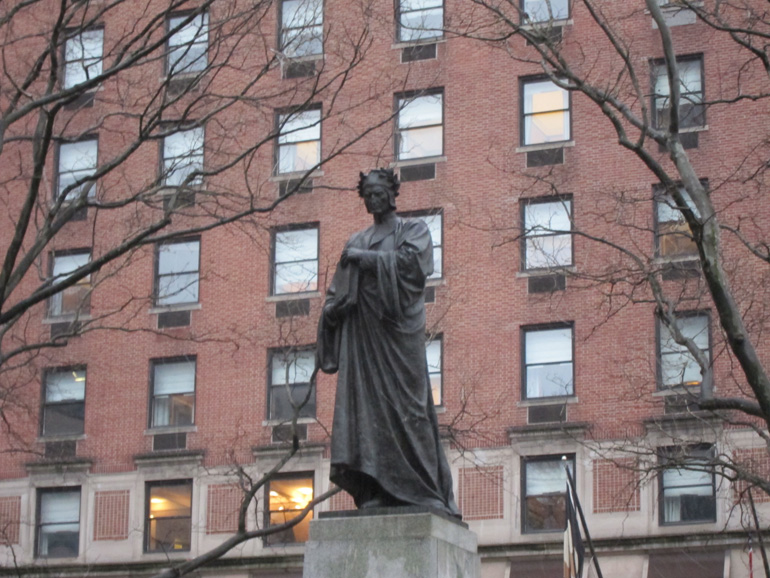Gotham Diary:
Wonder
20 March 2013
Shortly before his death, the legal philosopher Richard Dworkin forwarded a manuscript to the people at The New York Review of Books; Harvard will publish Religion Without God later this year, but the NYRB went ahead and published a portion of the first chapter in the current issue (LX 6). I read it dutifully over the weekend, much of it during the intervals at Paul Taylor. That is where the language that stuck in my mind came up. I say that I read the piece dutifully because I long ago learned that, although I looked for most of the same outcomes that Dworkin desired, his sobriety made me feel uncomfortably guilty of frivolity. Finally, on Saturday, I was able to put my finger on exactly what it is about Dworkin that puts me off. At the start of a section headed “What Is Religion: The Metaphysical Core,” Dworkin writes,
What, then, should we count as a religious attitude? I will try to provide a reasonably abstract and hence ecumenical account. The religious attitude accepts the full, independent reality of value. It accepts the objective truth of two central judgments about value. The first holds that human life has objective meaning or importance. Each person has an innate and inescapable responsibility to try to make his life a successful one: that means living well, accepting ethical responsibilities to oneself as well as moral responsibilities to others, not just if we happen to think this important but because it is in itself important whether we think so or not.
The second holds that what we call “natureâ€â€”the universe as a whole and in all its parts—is not just a matter of fact but is itself sublime: something of intrinsic value and wonder. Together these two comprehensive value judgments declare inherent value in both dimensions of human life: biological and biographical. We are part of nature because we have a physical being and duration: nature is the locus and nutrient of our physical lives. We are apart from nature because we are conscious of ourselves as making a life and must make decisions that, taken together, determine what life we have made.
I could go along with all of this — until I got to the mention of wonder. I simply do not experience the wonder of nature. I am often baffled by its complexity, but this is an unpleasant sensation that induces me to turn my thoughts elsewhere: to the sublimity of humanity. Nothing in the world is more sublime! But humanity does not inspire wonder — I’m not sufficiently detached. Great curiosity, yes, although curiosity measured by the sense that there are many things that we are not ready to know, just as the Egyptians were not ready to know about microbes or petroleum. I disapprove of making things up to fill in the bits that you don’t really understand; I want areas of ignorance to be as clearly marked as possible. “Wonder” sounds to me like an invitation to speculate.
Dworkin believes in the metaphysical reality of values, and he argues well on its behalf. But he doesn’t convince me, because I believe something else. I believe that values continually emerge, in ever clearer state, from the grinding polish of myriad human interactions. This is an historical progress (blotted by many horrible setbacks!). If we do not destroy the planet, I believe, we will learn to live together in peace, and we will learn from experience, not from speculative philosophers. Right now, we don’t know very much about our experience, familiar as it is; but cognitive science is going to establish a few benchmarks — I believe that, too. I believe that the forms that Plato and Plotinus believed in “out there” are actually “in here,” waiting for us to excavate them from our abstractions and generalizations. As we continually do.
At the end of the section about religion, Dworkin writes,
You may think that if all we can do to defend value judgments is appeal to other value judgments, and then finally to declare faith in the whole set of judgments, then our claims to objective truth are just whistles in the dark. But this challenge, however familiar, is not an argument against the religious worldview. It is only a rejection of that worldview. It denies the basic tenets of the religious attitude: it produces, at best, a standoff. You just do not have the religious point of view.
I agree with Dworkin’s last point wholeheartedly. I myself am not troubled by whistling in the dark — if that’s what we’re doing, it doesn’t invalidate our judgments. I agree that the religious worldview cannot be disproved, just as it cannot be proved. And it really is as simple as Dworkin puts it: I just do not have the religious point of view. Finally, I thought, standing in the aisle at State Theatre, a humane statement of the situation.

